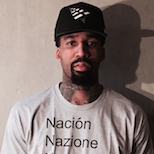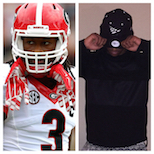Iman Shumpert Talks About His Recovery, Music and The Knicks
10.09.2012
SPORTS
It’s rare that a player comes into the NBA and quickly establishes himself as one of the game’s top perimeter defenders. New York Knicks’ Iman Shumpert was able to pull it off, making himself into a fan-favorite just one year into his career, earning NBA All-Rookie First Team honors in the process. Unfortunately, his season was cut short after he fell victim to a torn ACL in Game 1 of the Knicks’ first round matchup against the Heat last season. Life+Times caught up with the second-year guard to discuss his road to recovery, outlook on the Knicks’ upcoming season and more.
Life+Times: What went through your head initially when you got hurt?
Iman Shumpert: I knew my season was over. I didn’t know exactly what was wrong with it. I felt something pop, and then I felt a grinding feeling, so I knew something was all bad about it. I was praying that it wasn’t my ACL, but as soon as they tested it out in the back, they said, “You blew your ACL.” After that I just had to come to a realization, like, “Damn, what’s the process, what’s the recovery time?” They told me I’d probably be out six-eight [months], then I started my rehab the next day.
L+T: How has your recovery been and where are you at in the process?
IS: All I can say about the recovery is that they’re aiming for me to come back between December and February, and right now we’re doing mostly balance work and strength. That’s the main focus.
L+T: What’s been the more challenging part of your recovery, the mental or the physical?
IS: The biggest challenge is when you’re finally able to walk again and finally able to be in a gym, and [you have to] sit there restricting yourself even though your leg feels strong enough. My legs feels strong enough to do a lot of stuff, but I have to sit there and bite my lip and just not play. I probably could get out there and do some things, but even though my body is saying it feels good, I know that I’m not ready to be the same dude that I was. Having that patience and having that mental toughness to say, “not yet,” is the hardest part about this. Seeing other people play and have their accomplishments, and me having to just work on rehab is tough. That’s the hardest part.
L+T: With the Nets moving to Brooklyn, there’s two teams in New York now. Talk about what it means to have that potential rivalry now.
IS: It’s definitely something to talk about, but they gotta win first. We’re the Knicks. They’ve got to win first and prove that it’s gonna be a rivalry, because as far as I’m concerned we beat the Nets three times last year.
L+T: You all have a lot of new faces this season and are one of the oldest teams in the League this year. How has adding all of these experienced vets helped you all getting ready for this season?
IS: It’s huge. I definitely feel a lot more comfortable going into the season knowing that I’m surrounded by veteran guys, a couple of guys that have won titles. I feel like the advice they’re giving is going to be genuine and from a place that they’ve already succeeded in. For them to be able to bring that along, bring that knowledge and experience to the game, I feel a lot more comfortable learning from them. Not to say you can’t learn from other guys, but it’s a lot easier to listen to a champion and guys that have been through a couple of different teams, played for different systems. Guys have different insights on other teams and how they like to play, they’ve been around the league, they’ve been through trouble off the court and on the court. I’m surrounded with guys so that now I don’t feel like I can make any mistakes, because really, my whole team has made mistakes for me. I’m the youngest dude on the team, so going into it I feel like they’ve made all the mistakes for me, now I can just do everything the right way.
L+T: Having a rookie season under your belt, how do you feel now coming into the year as opposed to last season?
IS: For me, I’m gonna do the same things I did last year, and I’m looking to come in and add more things to my game. Last year they expected me to come in and defend, score in transition, and now I wanna be that guys that’s in the corner and they know I’m gonna knock down two 3’s per game when guys get double-teamed; I’m gonna get to the line and shoot six-eight free throws per game. I want guys to have that routine that Iman’s gonna score at least 10 points just off hitting his knock down shots and getting to the free throw line. Everything else will be extra, which I know I’ll continue to do — couple steals here and there, a couple pull ups, you know. Just be more in the scoring mix this year and definitely rebound the ball a whole lot more.
L+T: You’re one of the more active athletes on Twitter. How have you been able to use the platform to connect with fans – especially in light of being hurt and being in the off-season – and what is the #Post90s hashtag?
IS: The #Post90s thing is going to be revealed later, and it’ll be pretty self-explanatory. With me using Twitter, it’s just to touch the fans. With me going down with an injury, it was cool for fans to be able to say so much and Tweet me saying I’m in their prayers and thoughts each and everyday. I felt a lot closer to the fans. When I was drafted I was booed and when I came into New York I was almost trying to prove something to them. Going into my second year, I’ve met the fan that’s a child; I’ve met the fan that’s a mother of children that love the Knicks; I’ve met the diehard fan that gets off work early just in time to see the Knicks game; I’ve met the fan that leaves Wall Street, loosens up his tie, takes off his tie and sits in the front row. Now I feel like I’m playing for the people as opposed to just Iman Shumpert playing on the Knicks. Going into this [season], I definitely feel like I’m more connected to New York even though I’m a Chicago guy.
LT: Touch on where you’re at with your music. Has being injured given you a little bit more time to be in the studio, is that somewhere you’ve turned to to relieve some of that stress?
IS: Yeah, the studio definitely has helped me relieve a lot of stress. It was really the only thing I could turn to, the only thing I could physically do every single day that wouldn’t be detrimental to my health and my growth as far as my rehab went. I definitely have worked a lot on the music, but I always write. I’ve been writing since sixth grade and I’ve never stopped, so it’s not something that has ever stolen any of my attention span away from basketball, it’s always been something that’s helped. It makes me be a more articulate person, I feel. It helps me get a lot of things off my chest when I may not be able to express it any other way. I don’t rap just to do music, I do it with a purpose and I do it to discuss problems that I feel should be discussed. With my mixtape, it’s finally done. I had some stuff on there that I wanted talk over with the Knicks and the NBA just to make sure I’m not stepping on anybodies toes. A lot of the things I touch on are so real and I want to bring them to the light, but I don’t want anything to be conflicting with the image of the NBA or the Knicks so I’m picking and choosing what songs I want to put out and it should be out soon.





